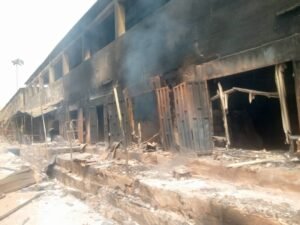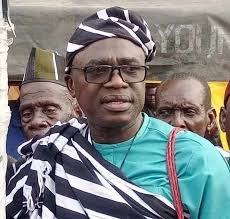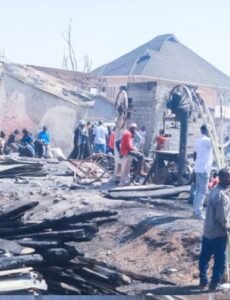*Peace Remains Elusive
In 2025 alone, 35 Nigerian states collectively allocated a staggering N214 billion toward improving security funding local security outfits, purchasing arms, and setting up defence initiatives.
The aim, according to data from Open States, was clear: end the rising tide of violence across the country.
Yet, insecurity has persisted. From 2019 to 2025, at least 367 people were killed during festive periods like Christmas and Sallah. In early 2025 alone, Nigeria recorded 2,819 abductions, 3,190 fatalities, and 1,123 injuries, spanning 428 out of 774 local government areas. Juliet Jacob evaluates the human carnage and mindless destructions almost frequently, despite annual massive budgetary commitments.
Constitutional Guarantees, Brutally Undermined

Section 33(1) of Nigeria’s 1999 Constitution (as amended) guarantees every citizen the right to life. It is the foundation upon which all other rights rest. And yet, across Nigeria, that right is under relentless attack.
In Plateau State, the horror is ongoing. On March 28 and April 2, 2025, gunmen invaded several communities in coordinated assaults, killing dozens and displacing many. Survivors recounted nightmarish scenes of bloodshed and displacement.
Budget Breakdown: Huge Sums, Little Relief
State governments have shown readiness to spend—but results remain underwhelming: Benue State: N1.46 billion allocated, Plateau State: N7.36 billion allocated. These figures, while reflective of good intentions, have yet to yield real security outcomes. In both states, violence and mass displacement continue with alarming frequency.

Holiday Bloodshed: Celebrations Turned Tragedy
Festive periods have become synonymous with massacre: Christmas 2023: Over 150 people killed in Plateau during coordinated attacks, December 25, 2024 (Benue): 47 people murdered, including 11 churchgoers returning from service in Kwande LGA, December 22, 2024 (Gidan Ado, Plateau): 15 killed just days before Christmas, Sha Village (Bokkos, Plateau): 3 Christians murdered in a late-night ambush.
These atrocities point to a troubling trend celebration days now come with heightened fear.
Crisis in the First Quarter of 2025
Between January and March 2025 alone, insecurity surged, 2,819 people abducted, 3,190 killed 1,123 injured.
The numbers speak to a nationwide breakdown of security, casting doubt on the efficacy of billions spent.
Citizens React: From Pain to Protest
Benue: Anger Boils Over in Naka
In Gwer West LGA, protests erupted after herders killed three members of the Civil Protection Guards. What began as a clash over farmland spiraled into chaos—homes, shops, and vehicles torched. Though police arrested two suspects, residents remain fearful.

Plateau: Tragedy Without End
Despite its N7.36 billion security allocation, Plateau State continues to mourn:
In Bokkos LGA, 10 people were killed across five communities.
Just six days earlier, gunmen attacked a wake in Ruwi community, killing 10 and injuring three.
The attacks are frequent, coordinated, and devastating.
Federal Government’s Version vs. Reality
National Security Adviser Nuhu Ribadu insists that violent deaths have dropped by 90% between December 2023 and November 2024. He cites ACLED data and a record of 2,000 terrorist prosecutions.
Yet, ACLED’s own reports paint a darker picture: 9,355 violent deaths within the same period, placing Nigeria among the top global hotspots for political violence.
Legal Voices Demand Accountability
Prominent human rights lawyer Femi Falana (SAN) is calling for justice. As Chairman of the Alliance on Surviving COVID-19 and Beyond (ASCAB), he condemned the killings and demanded that the government “fish out the culprits.”
Falana emphasized the need for a people-driven security strategy, saying:

“The Nigerian state must seek the cooperation of the people, in good faith, to achieve lasting peace.”
Benue Government Admits Policy Failures, Pivots to Dialogue
According to Joseph Har, Special Adviser on Security to the Benue State Governor, previous administrations “created structural gaps” that have worsened the crisis. Speaking during a peacebuilding workshop, Har stressed a carrot-and-stick approach: combine community dialogue with strong enforcement.
Data supports the crisis:
In early 2021, Benue recorded 38 violent incidents in four months.
As of December 2020, it had over 204,000 Internally Displaced Persons (IDPs)—the highest in North Central Nigeria.
Clampdown on IDP Camp Visits Amid Ongoing Crisis
In a bid to streamline humanitarian activities and enhance protection, Governor Hyacinth Alia has tightened protocols for visiting IDP camps across Benue. Individuals and organizations must now secure formal approvals before engaging displaced communities.
Ex-Military Governor Urges Action as Insecurity Worsens in Plateau, Alleges Perpetrators Act with Impunity
Rear Admiral Samuel Atukum (Retired), former Military Administrator of the old Plateau State, has raised alarm over the worsening security situation in the state, urging the Federal Government and security agencies to go beyond routine responses and implement decisive, targeted actions.

Atukum decried the seeming impunity of those behind recent deadly attacks on Plateau communities. He alleged that the perpetrators had openly claimed responsibility during a press conference in Kaduna—just days after coordinated assaults on five communities resulted in multiple deaths, injuries, and widespread displacement.
According to Atukum, the attacks are not random acts of violence but part of a calculated agenda involving land grabbing and economic destabilization. He called for urgent intervention to prevent further escalation and restore public trust in the government’s ability to protect lives and property.
Insecurity in Benue and Plateau States Threatens Nigeria’s Food Security and Economy
The escalating insecurity in Benue and Plateau States—two of Nigeria’s most critical food-producing regions—is deepening an agricultural crisis that now threatens the country’s food security and economic stability. These regions form the heart of the Middle Belt, long considered Nigeria’s breadbasket. However, a surge in violent attacks by armed herdsmen, bandits, and other non-state actors has forced thousands to abandon their farms, disrupting the backbone of the nation’s food supply.


Disruption of Farming Activities
Ongoing violence in rural communities has led to the mass displacement of farmers. According to Amnesty International, attacks in Plateau and Benue have intensified since late 2023, with over 300 people killed in the last quarter alone, and dozens of farming settlements razed. The Armed Conflict Location & Event Data Project (ACLED) records hundreds of incidents involving armed violence against civilians in these states between 2023 and early 2025.
As a result, vast tracts of arable land have been left uncultivated. Fear of further attacks has kept displaced farmers away, significantly reducing agricultural productivity.
Reduced Agricultural Output
Benue State, known as the “Food Basket of the Nation”, is a top producer of yams, soybeans, rice, maize, and cassava. Plateau State contributes significantly to the supply of vegetables, potatoes, grains, and livestock. With the disruption of farming and attacks on rural supply routes, harvest volumes have plummeted.
This has had a ripple effect on food availability and distribution across the country, particularly in urban centers that rely on Middle Belt produce.
Rising Food Prices and Inflation
The consequences of dwindling agricultural output are evident in Nigeria’s food inflation figures. According to the National Bureau of Statistics (NBS), the food inflation rate rose to 35.41% in March 2025, remaining one of the highest contributors to overall inflation. Insecurity-induced shocks to the food supply chain have led to acute scarcity, which in turn has driven prices upward.
To bridge the food gap, Nigeria has increased food imports, further straining foreign reserves and worsening the trade imbalance.
Loss of Livelihoods and Rural Economies
Farming remains the primary source of income for most households in Benue and Plateau. As insecurity escalates, these livelihoods have been decimated. The result is a surge in poverty, hunger, and dependence on humanitarian aid.
The number of Internally Displaced Persons (IDPs) continues to rise. In Benue alone, the State Emergency Management Agency (SEMA) reports over 2 million IDPs as of March 2025. Host communities are overwhelmed, and state resources are stretched thin.
Decline in Agricultural Investment
With rising violence, agro-investors and development partners are retreating from high-risk areas. Key projects aimed at boosting agricultural productivity and food security have stalled or been abandoned altogether. This withdrawal stifles innovation, limits access to credit, and undermines long-term growth in the sector.
Strain on National Food Security
Nigeria’s food security strategy hinges on the stability of the Middle Belt. As conflict continues, national food reserves are under threat, and malnutrition rates are rising, particularly among children in conflict-affected regions. According to the United Nations, over 30% of children under five in these areas are acutely malnourished.
Broader Economic Implications
Agriculture contributes roughly 25% to Nigeria’s Gross Domestic Product (GDP). A disruption of this scale has broader macroeconomic consequences:
Rural job losses trigger ripple effects in transportation, processing, and retail sectors.
Government spending is diverted from development projects to emergency relief and security.
Foreign Direct Investment (FDI) in agriculture and rural development is discouraged
Conclusion: The Questions That Refuse to Die are:
With billions in security funding and thousands still dead, injured, or kidnapped, Nigerians are asking:
Where is the money going?
Why is peace still out of reach?
When will justice finally arrive?
While security remains a federal mandate, state-level interventions have so far failed to provide safety. As violence escalates and hunger looms, the calls for accountability, reform, and community-led policing grow louder.



